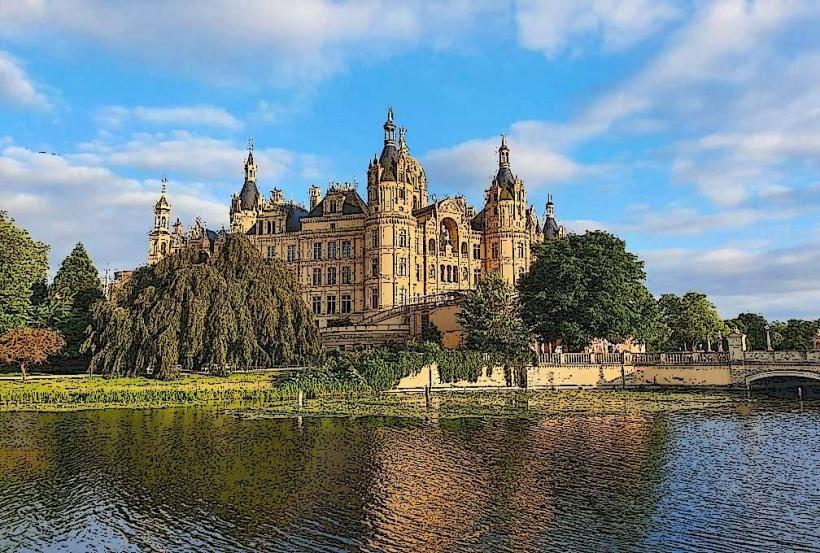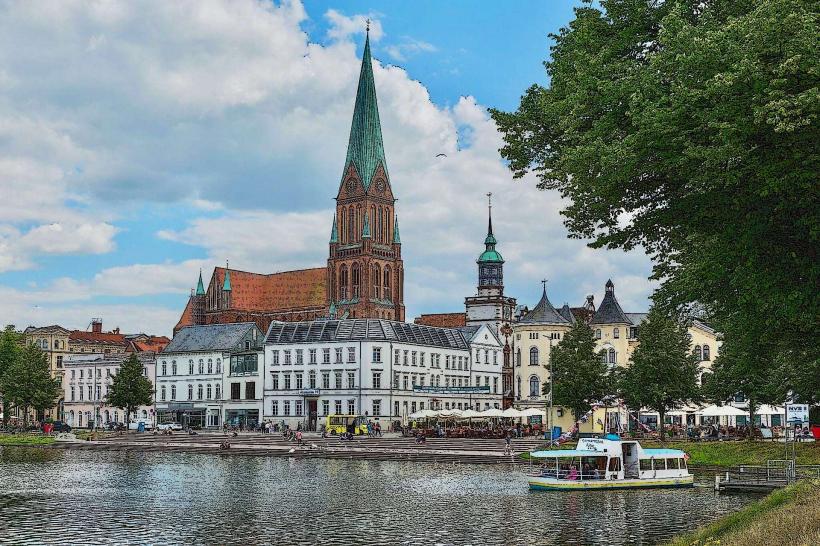Information
City: SchwerinCountry: Germany
Continent: Europe
Schwerin is the capital city of the northeastern German state of Mecklenburg-Vorpommern. Situated on the shores of Lake Schwerin, the city is known for its fairytale-like castle, scenic lakesides, and rich cultural history. Schwerin is often referred to as the "City of Seven Lakes" due to the abundance of water bodies surrounding it, contributing to its tranquil and picturesque charm.
1. Historical Background
- Early History: Schwerin’s history dates back to the Slavic settlement in the region around the 10th century. It became a significant center during the early medieval period, especially after the establishment of the Duchy of Mecklenburg in the 12th century. The city's name derives from the Slavic word "swerin," which means "castle" or "fortified town."
- Duchy of Mecklenburg: Schwerin was the capital of the Duchy of Mecklenburg for centuries, and its history is closely tied to the Mecklenburg dynasty. The city’s development as a political and cultural hub flourished under the rule of the dukes, particularly during the 17th and 18th centuries.
2. Schwerin Castle (Schweriner Schloss)
- Iconic Landmark: The Schwerin Castle is undoubtedly the most famous landmark in the city. Perched on an island in Lake Schwerin, it resembles a fairytale fortress with its spires and grand architecture. Originally built in the 10th century as a Slavic fort, it was later expanded in the 19th century to reflect the Neo-Renaissance style.
- Architectural Features: The castle is an architectural gem, with ornate towers, a lavish interior, and stunning views of the surrounding lakes and parks. The Schwerin Castle Park is an excellent spot for walks and offers beautiful vistas of the lake and the castle itself.
- Palace and Museum: Today, Schwerin Castle houses the Schwerin State Museum (Schweriner Landesmuseum), which displays a collection of fine art, sculptures, and historical exhibits. The castle also serves as the seat of the state parliament of Mecklenburg-Vorpommern.
3. Lake Schwerin and Surroundings
- Scenic Beauty: Lake Schwerin, the fourth-largest lake in northern Germany, is the heart of the city, with numerous smaller lakes dotting the landscape. The lake provides a stunning backdrop for the city and is ideal for recreational activities such as boating, kayaking, and fishing.
- Island Exploration: Visitors can take boat tours to explore the various islands on Lake Schwerin, including the one that hosts the castle. The surrounding lakesides are perfect for relaxing, picnicking, and enjoying the outdoors.
- Schweriner See Promenade: The promenade along the shores of Lake Schwerin offers picturesque views and is a lovely place for a walk or cycle ride. The park surrounding the castle is also a popular spot for both locals and tourists.
4. Historical and Cultural Sites
- St. Mary's Church (Marienkirche): The St. Mary's Church is one of Schwerin’s most important medieval buildings, dating back to the 14th century. The church features stunning Gothic architecture, with a tall spire and beautiful stained-glass windows. It also houses a historic organ and is a popular site for concerts and cultural events.
- Schwerin Cathedral: The Schwerin Cathedral, located in the city center, is another important religious structure. With its Gothic architecture and impressive twin towers, it is an iconic part of the city’s skyline. Inside, visitors can admire the beautiful stained-glass windows and explore the church's rich history.
- Alter Garten: The Alter Garten is a charming square in the center of Schwerin, surrounded by historical buildings and the scenic views of Lake Schwerin. The square has been a center of the city for centuries and is now a place for cultural events, exhibitions, and relaxation.
5. Museums and Art
- Schwerin State Museum: Located within Schwerin Castle, the Schwerin State Museum is home to a broad collection of art and historical artifacts. The museum’s collection includes works from the 16th century to modern-day art, with a focus on regional artists, 19th-century Romanticism, and contemporary art.
- Museum of Technology: For those interested in the region’s industrial history, the Museum of Technology in Schwerin offers exhibits on the development of technology and machinery. The museum showcases historical items, including vintage cars, steam engines, and other technological innovations from the 19th and 20th centuries.
6. Parks and Nature
- Schwerin Castle Gardens: The gardens surrounding Schwerin Castle are beautifully landscaped, with well-maintained flowerbeds, sculptures, and paths leading to stunning viewpoints over the lake. The castle park is an ideal place for walking and photography.
- Langeooge Park: This expansive park offers lush green spaces, a tranquil atmosphere, and views of the lake. It’s perfect for a day of relaxation, picnicking, or exploring on foot or by bike.
- Großer Dreesch Park: Located in the residential area of Großer Dreesch, this park provides a more rural feel, with wooded areas and pathways perfect for nature walks and exploration.
7. Theatrical and Musical Culture
- Schwerin Theatre: The Schwerin Theatre is a cultural venue that hosts a variety of performances, including plays, operas, and ballets. The theater is housed in an impressive building dating back to the 19th century and is an important cultural institution in the region.
- Schwerin Philharmonic Orchestra: The Schwerin Philharmonic Orchestra is one of the most notable classical music ensembles in the region. They perform at the Schwerin Theatre and other venues around the city, offering a wide range of concerts from classical symphonies to modern compositions.
8. Schwerin’s Festivals
- Schweriner Schlossfest: The Schweriner Schlossfest (Schwerin Castle Festival) is a popular annual event held in the summer. It celebrates the city's royal and cultural heritage with live performances, music, and theater held in the grounds of the castle. The festival includes medieval reenactments, craft markets, and fireworks.
- Schweriner Film Festival: The Schweriner Film Festival is an event dedicated to independent and international cinema. It brings filmmakers and cinephiles together to celebrate film art, featuring screenings, workshops, and discussions.
- Lake Festival (Seenachtfest): Held every summer, the Lake Festival is a vibrant event with music, food, and fireworks by the lake. The festival features live bands, boat parades, and various performances, creating a festive atmosphere that attracts visitors from all over.
9. Cuisine and Dining
- Local Specialties: Schwerin, like much of Mecklenburg-Vorpommern, is known for its seafood dishes, particularly those featuring fresh fish from the lakes and rivers in the area. Mecklenburger Räucherfisch (smoked fish) is a local delicacy often served with bread and mustard.
- Schwerin Beer: The region is known for its beer culture, and visitors can enjoy a variety of locally brewed beers in the city's pubs and beer gardens. Schweriner Brauerei is one of the local breweries that offers traditional Bavarian-style lagers and ales.
- Traditional German Cuisine: In addition to seafood, Schwerin's restaurants serve hearty German fare, such as Sauerbraten (roast beef), Wiener Schnitzel (breaded veal), and Kartoffelsalat (potato salad).
10. Modern Infrastructure and Accessibility
- Transportation: Schwerin is well-connected by road and rail. The Schwerin Hauptbahnhof (main train station) offers connections to major cities in Germany, including Hamburg and Berlin. The city's public transportation network, including buses and trams, makes it easy to get around the city.
- Cycling: Schwerin is a bike-friendly city, and visitors can explore the lakes, parks, and historical sites by cycling. There are many scenic routes that offer beautiful views of the natural surroundings.
- Shopping: The city has a number of shopping areas, including the Altstadt (Old Town), where visitors can find local boutiques, crafts, and artisanal products. The Schweriner Einkaufszentrum (Schwerin Shopping Center) is another popular destination for more mainstream shopping needs.
Conclusion
Schwerin is a city that combines the best of both history and nature. From the stunning Schwerin Castle to its peaceful lakeside settings, the city offers a wealth of cultural experiences, beautiful parks, and rich historical landmarks. Whether you're exploring the castle grounds, enjoying a boat ride on Lake Schwerin, or delving into the city's arts and festivals, Schwerin offers something for everyone, making it an ideal destination for history lovers, nature enthusiasts, and those looking for a peaceful getaway in northeastern Germany.




